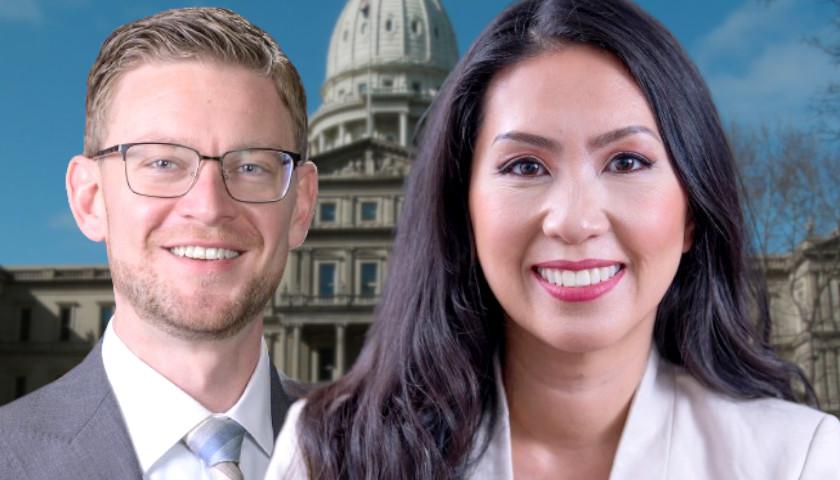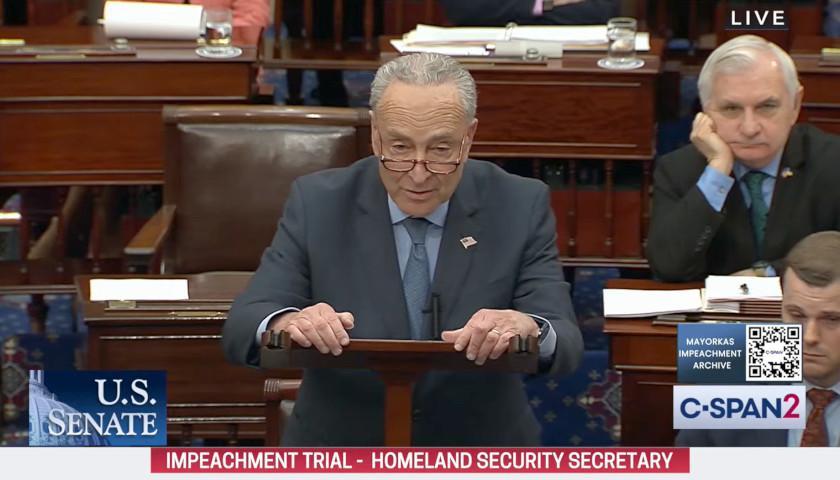Live from Music Row Friday morning on The Tennessee Star Report with Michael Patrick Leahy – broadcast on Nashville’s Talk Radio 98.3 and 1510 WLAC weekdays from 5:00 a.m. to 8:00 a.m. – host Leahy welcomed the original all-star panelist Crom Carmichael to the studio to discuss the need for institutional constraints so that the government can properly function.
Leahy: Tennessee’s in the red zone in coronavirus cases. What really does that mean?
Carmichael: I mean, I have no earthly idea (Leahy laughs) what the red zone is.
Leahy: Is it like that football last 20 yards now?
Carmichael: They just keep moving. What they do is the authorities just keep moving and the media kind of plays along. They keep moving the goalposts. If you’ll recall flattening the curve, to begin with, had all to do about making sure that we had enough medical facilities to support the people who needed them. So then once we got past that then all of a sudden then what mattered the number of cases.
It didn’t matter whether or not the people who came down with coronavirus recovered and never had to go to the hospital that didn’t matter. It just became the number of cases. Then they made it the number of deaths but included in the number of deaths are people who died primarily from some other illness but happened to have coronavirus when they died.
And we know that to be true because the United States represents 5 percent of the world population but it represents 25 percent of the deaths in the world from coronavirus. Which means that either the rest of the world is grossly under-reporting the number of deaths. Or it means that we’re grossly over-reporting.
Leahy: I’m guessing that it’s the latter.
Carmichael: We are because when other countries in the world when they report a death from coronavirus, it’s actually a death from coronavirus. It’s not somebody who was in the process of dying from cancer who also had Coronavirus. George Floyd turned out to have had the coronavirus when he died. He had coronavirus.
Leahy: Is he listed among them?
Carmichael: I have no idea. but they did report that he had coronavirus. And so so you have this problem with the language. One thing that Trump should have done it the very outset, well there were three things I wish he had done. One is I wish he had required the CDC to report the number of deaths only from coronavirus. If they want to report the other that’s okay.
But they ought to have to report the number of deaths that were exclusively from coronavirus. The other is he should have had the CDC report the number of people who died in the United States from other causes during the same time period because then you’d see just how many people die from other things.
And then the third thing that he should have done was when he put in the national emergency or whatever it is, he said until these national emergency dictates are lifted, no member of the media can make more than the average cameraman. (Leahy laughs) That’s what they should have done. And then all of a sudden the people who do the reporting and the and their bosses this would have been from the president of NBC News all the way down. They can make no more money during the pandemic than the average cameraman salary.
Leahy: It’s only fair Crom.
Carmichael: And that would be fair and it would also have them focus on the fact that there are competing what Trey Gowdy called competing harms. When you have competing harms, you make the best decision you can recognize that whatever decision you make there’s going to be some negative effect. And so what you hope to do is that you hope to make the decision that has the fewest negative effects. And so but getting back to what we were talking about Michael with Jim Roberts.
Leahy: A great attorney. A great American. And a great Nashvillian.
Carmichael: Yeah, we talked a lot about institutional constraints and we’re very fortunate here in Nashville to have a Nashville charter that allows the voters to ultimately provide that institutional constraint against a government policy that they don’t like. And in this case, the vote 27,000 people said we’d like to have all the voters have an opportunity to chime in on whether or not a 34 percent tax increase is in the city is in the city’s interest. And who better to decide that then the people who live here the voters. Not the government that controls. And you know government elected officials like to call themselves public servants. What a bunch of what a crock.
Leahy: Good catch. Good catch there. They are not public servants.
Carmichael: The constitution was not a perfect document. In fact, the people who signed the constitution and completed new it wasn’t a perfect document. But it was the best that they could come up with given the circumstances at the time. Because in order to have the constitution take effect you had to have a certain number of states or maybe it was all about. I don’t remember Michael you would know this. A certain number of states had to vote their legislators had to vote yes on the constitution. Nine. Nine out of 13. Nine out of 13. And ultimately nine out of the 13 did ultimately.
Leahy: Although real Rhode Island took a long time to do it.
Carmichael: Okay. Well, thank you. That’s great information. But nine had to.
Leahy: Yes.
Carmichael: So they had to create a document that would get that we get nine states to agree to it. And so what the purpose of the constitution was including its flaws, but what its purpose was to make a national government possible. And also then limit the powers of that national government. And they did it with checks and balances and institutional constraints.
They had the executive branch. They had the Congress. And they had the courts. And it was the role of the courts to make sure that the executive branch and the and the legislative branch did not overstep their authority under the constitution. And it is institutional constraints, you see it right here in Nashville. The Democrat Party controls the city government.
Leahy: Absolutely.
Carmichael: It does not want to be constrained by the city by the charter.
Leahy: At all. No constraints on spending.
Carmichael: Bob Cooper, I know I’m sure you’re a nice guy.
Leahy: Bob Cooper of Metro Legal and former Attorney General.
Carmichael: Yeah, what you’re arguing is wrong.
Leahy: Yeah. It’s very it’s wrong.
Carmichael: It is not just a bad legal argument if you try to blow up the institutional constraints. We’re going to end up in just the same situation as Chicago because that’s human nature. So it’s very very important that this institutional constraint.
Leahy: You know, I really would like to have Bob Cooper to come in.
Carmichael: I would love that. We are not mean people. We are vigorous proponents of our point of view and I think Bob Cooper certainly has the intellect and the capability to handle us here one-on-one in the studio. We’ll invite him.
Carmichael: Yeah the mayor does too.
Leahy: Well…
Carmichael: No. The mayor does too. You’ve invited him to come on the show.
Leahy: He’s declined multiple times.
Carmichael: I understand but he’s welcome anytime.
Leahy: He is welcome.
Carmichael: Yeah, and and and the point of the institutional constraint, I don’t know how the voters will vote. I think I know. I have a prediction of how they vote but that doesn’t mean I’m right. But the institutional constraint is to allow if the proper steps are taken which Jim Roberts and his organization did. The proper steps that have been taken the voters now, get to chime in on whether or not they think the government has done something that it shouldn’t.
Leahy: You know, I think it would be a great public service crime if we would invite we would invite both Mayor John Cooper and Metro legal director Bob Cooper to come in sit here with us and dedicate the entire hour and a half that you’re in here any Monday Wednesday Friday, and we’ll just have an open discussion about this issue. And we’ll make our case. They’ll make their case. And our listeners, you know can decide what they think. Now it’s not a Judicial hearing, right? That’s where how they want to handle it. But you know the court of public opinion matters, I think
Carmichael: Well, it’s supposed to that’s the point that’s what this is. So in Metro are our institutional constraint has been given to the citizens if they follow a certain procedure.
Leahy: Through the charter.
Carmichael: And at the state level our government is constrained because we have to balance our budget and we don’t have an income tax. And so the government even when the Democrats ran the state and they did back in the 80s. The Democrats were in control of the state. The Democrats still had to manage within the constraints that existed. And so so it’s very very interesting when institutional constraints are abandoned and that’s what the Democrat Party is trying to do nationally.
Leahy: Yes.
Carmichael: When institutional constraints are abandoned terrible things happen as a result because human nature is a constant.
Listen to the full third hour here:
– – –
Tune in weekdays from 5:00 – 8:00 a.m. to the Tennessee Star Report with Michael Patrick Leahy on Talk Radio 98.3 FM WLAC 1510. Listen online at iHeart Radio.








